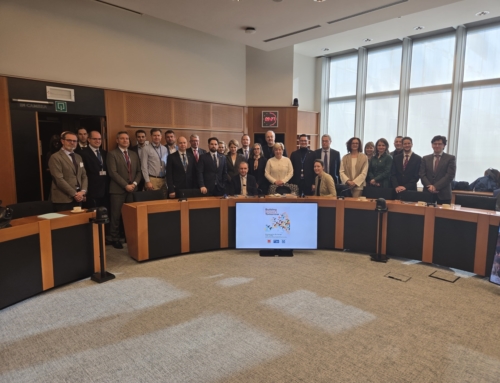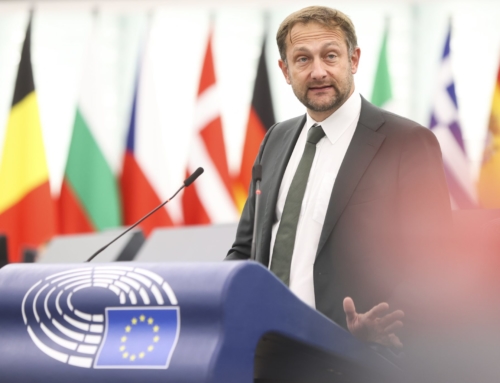Brussels, the 24th of November
On Tuesday, November 21, 2023, during the Plenary Session in Strasbourg, the majority of parliamentarians voted in favour of the initiative on “Reducing Inequalities and Promoting Social Inclusion in Times of Crisis for Children and Their Families“, presented by MEP Sandra Pereira (GUE, Portugal), from the EMPL Committee. This report has been under discussion since May of this year in the European Parliament, addressing topics related to family policy, child protection, and social inclusion.
A) Mental health and protection of children from online risks
FAFCE welcomes the Parliament’s awareness-rising on the current challenges of mental health problems of children and the importance to take more measures to help the children: “Mental health well-being for children is key, as it allows them to reach developmental milestones, learn ways of coping with problems and acquire social and emotional skills”.
The Parliament points out several causes for mental health of children, amongst which FAFCE wants to highlight the “inadequate access” to online services as one of the main causes of mental health problems in children. The Parliament raised that “ the risks of pervasive digital technologies for the health and well-being of children and their families should not be underestimated”, calling for children’s rights “to be protected from the marketing and advertising practices of commercial operators, including in digital spaces”.
FAFCE aligns with the Parliaments observation that “the design of current online products and services exposes children from an early age to addictive online content; whereas children lack the basic necessary skills and know-how to consume information in a safe and trusted manner; whereas this has consequences on children’s mental health, including sleep deprivation, anxiety, depression, lack of attention and, ultimately, brain development in the long term; whereas increased internet use can put children at greater risk of online harm such as sexual exploitation, cyber stalking and cyberbullying”.
FAFCE further invites the EU institutions to include more explicitly children’s exposures to online pornography, remembering that the EU Strategy for a Better Internet for Children recognized it as a risk for children.
More on FAFCE work on mental health and online risks for children:
- European Parliament: new measures against child sexual abuse online
- The role of families in dealing with mental health crisis
- Young people and mental health: families as their best allies
- better child protection in online video games environment
- European Commission Consultation on Stopping Online Child Sexual Abuse
- The Council of Europe calls to protect children from online pornography
- European Union Moves Forward in its Fight Against Online Child Sexual Abuse
B) Work-life balance
FAFCE welcomes the Parliament’s recommendation to “underline the importance of guaranteeing a work-life balance by, inter alia, maternity, paternity, care and parental leave, and flexible working arrangements for parents and carers, including, for example, the option of reduced working time.” FAFCE wants to include in this reflection the need to ensure adequate and fully paid access to maternity, paternity and parental leaves for parents, regardless of effective time worked. Recognising the value of unpaid work within the workplace is key to creating a safe and healthy environment for parents, in order to ease the already difficult challenge to conciliate work life and family life.
Furthermore, the Parliament called for a “more equal distribution of care and housework, making it possible for women to return to work after pregnancy and maternity leave and allowing for an appropriate amount of time and adequate facilities for breastfeeding after returning to work” with the aim to “fight against gender-based discrimination and pay discrimination”. FAFCE wants to highlight on this point the need to ensure the full freedom to parents to decide on the division of the leave between the father and the mother; and encourage flexible working arrangements for parents, such as telework, part-time, breastfeeding and nursery rooms.
FAFCE welcomes the call of the Parliament to the Commission and the Member States to ”actively promote breastfeeding, in line with WHO recommendations”.
The Parliament highlights the problems of lack of childcare facilities and educational opportunities: “Working parents who do not have access to a childcare facility are often forced to leave children in informal care, including in uncertified care networks; whereas high-quality inclusive ECEC ensures equal educational opportunities for those children and fosters the integration of parents, especially mothers, into the labour market”.
In addition, the Parliament called “on the Commission and the Member States to promote the creation of quality jobs with open-ended forms of employment and innovative forms of work with strong labour rights, based on decent and fair wages and decent working conditions”. On this line, FAFCE welcomes the efforts to end discrimination of women in the workplace and suggests to launch additional measures for large families and families with special needs.
More about FAFCE work for a better work-life balance in Europe:
- The European Parliament recalls the heavy work of caregivers during the pandemic and their risk to poverty
- FAFCE addresses the motherhood and parental pay gap in a public consultation on pay transparency measures
- FAFCE Webinar on “Family work-life balance in times of changes” calls to invest in families and equal opportunities for parents
- Family and teleworking: FAFCE stresses the commitment and struggles of parents
- Challenges of pregnancy and motherhood in the workplace
- European Parliament recognises the importance of the family in Employment and social policies
C) Child poverty:
The European Parliament calls for awareness that the “lack of accessible, quality, child centred services and support for families increase the risk of child poverty and social exclusion”. Furtheron, the Parliament observed that “child poverty is a multidimensional phenomenon stemming from household poverty, meaning that low-income and lower-education families, single-parent families – mostly made up of women and their children – large disadvantaged families, families living in disadvantaged regions, families from different ethnic minorities and families with children or parents with disabilities are at greater risk of poverty and social exclusion and have a higher probability of intergenerational transmission of poverty”.
As the European Parliament’s resolution makes clear, the fight against child poverty and social exclusion begins with equipping families and recognising their essential role for the society.
D) Families and civic society at the heart of social cohesion
FAFCE welcomes the Parliament call “on the Commission and the Member States to bolster, at every level, mechanisms for ensuring the meaningful, safe and inclusive participation of children, families, carers and civil society organisations in the development, implementation, monitoring and assessment of these policies; stresses the importance of a multi-sectoral approach in which all relevant stakeholders work in partnership to develop an integrated strategy to tackle inequalities in childhood with the provision of child protection and family welfare services, for which structural investments and effective public expenditure, using EU and national funds, are most needed”.
FAFCE welcomes the Parliaments approach of supporting families, calling “on the Commission and the Member States to promote family-centred childhood policies and intervention, paying attention to the needs and aspirations of families, as an element to enhance cohesion in society”.
E) FAFCE concerns on the report
FAFCE regrets that the Parliament entered into subjects of exclusive Member States’ competence regarding family planning, urging them to adopt “less restrictive” laws on the access to sexual health and to “guarantee women the right to sexual and reproductive health”. FAFCE recalls that the health of women during pregnancy and childbirth and the health of children shall be a priority and that Member States shall adopt maternity leaves and arrangements that guarantee the freedom to choose breastfeeding and to stay at home.
FAFCE highlights concerns on the Parliaments call to adopt the Commission’s proposal of the “recognition of parenthood between Member States”, recalling that the European Union is overstepping its competences with this proposal, legislating on family matters that are an exclusive competence of Member States. FAFCE explained its detailed concerns on this proposal on the 7th of November 2o23.








